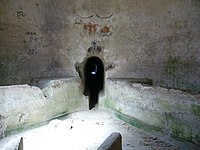Pompeii
by Robert Harris
Marcus Attilius Primus arrives in the Bay of Naples from Rome to take charge as aquarius (hydraulic engineer) of the Aqua Augusta, the aqueduct that supplies water to the towns in the region encompassing the Bay of Naples and Mount Vesuvius. The nine important towns are, in order, Pompeii, Nola, Acerrae, Atella, Napoli, Puteoli, Cumae, Baiae, and Misenum. Attilius's predecessor, Exomnius, has mysteriously vanished as the springs that flow through the aqueduct begin to fail, which reduces the supply of water available to the region's reservoir. Attilius is unpopular among the workers, particularly Corax, who resents the young foreigner giving him orders. Attilius's concerns about the water are heightened when he is summoned by a young, wealthy woman, Corelia, to investigate water that apparently killed her father's prized fish. Corelia's father is the former slave and land speculator Numerius Popidius Ampliatus, who came to fortune after he rebuilt Pompeii from a past earthquake. Ampliatus feeds to eels the slave he deems responsible for the fish's death for his own amusement. Attilius realises that unusually, sulfur poisoned the water.
Dramatically, the flow of water then stops entirely. Attilius concludes that the aqueduct must be blocked somewhere close to Mount Vesuvius since reports claim a shutdown of the system just before Nola. That means that towns from there through Napoli and Misenum are without any water supply. With aid from Pliny the Elder, whose fleet is docked at Misenum, Attilius assembles an expedition to travel to Pompeii, the closest town still being supplied with water, and then on to the blocked section of the Aqua Augusta.
While Attilius' expedition is there, he becomes embroiled as part of a plot by Ampliatus. Ampliatus plans to offer a cheap water supply to Pompeii, which Exomnius had helped him to do while he steals from the imperial treasury. Ampliatus tries to persuade Attilius to fill in Exomnius's role, but he refuses.
Attilius's questions and studies make Ampliatus suspicious, and the latter makes arrangements for Attilius to be assassinated. Attilius begins to suspect Ampliatus of bribery, suspicions that are supported by what Pliny the Elder and his nephew later discover: thousands of Roman sesterces at the bottom of the reservoir that should have gone to Rome. Attilius's predecessor had intended to retrieve them once he had emptied the reservoir. Corelia gets Attilius the proof that he needs from her father's written records when he is performing repairs to a collapsed section of tunnel in the region around Vesuvius. Attilius also discovers that Exomnius was investigating the phenomena around Vesuvius since he recognised some of them from his hometown of Catania after an eruption of Mount Etna. While exploring Vesuvius on his own, Attilius discovers Exomnius's corpse in a pit of earth choked by noxious fumes, which also kills Corax, who has come to assassinate Attilius.
The eruption of Mount Vesuvius on 24 August overwhelms Pompeii, Oplontis, and Herculaneum. Attilius risks his life and comes back to Pompeii to find Corelia. A deranged Ampliatus refuses to evacuate, first holds his family and then Attilius captive and believes that he will become even richer and more powerful by rebuilding the city once more after it is destroyed. Attilius rescues Corelia but is pursued by Ampliatus and his men, even as pyroclastic flows begin to descend on Pompeii. Attilius and Corelia enter the aqueduct and dig their way to safety. Ampliatus is killed by the overwhelming heat of the pyroclastic flow, along with the rest of his family and the rest of the expedition. Pliny dies from the effects of the fumes while he tries to evacuate the citizens.
Pompeii is buried underneath rocks, pumice, ash, and volcanic material and leaves few survivors. The last sentence of the novel reports a local legend that a man and woman had emerged from the aqueduct after the eruption, which implies that Attilius and Corelia likely survived the trip up the aqueduct.
The incident of Ampliatus feeding a slave to his eels is based on the actual historical case of Vedius Pollio.
